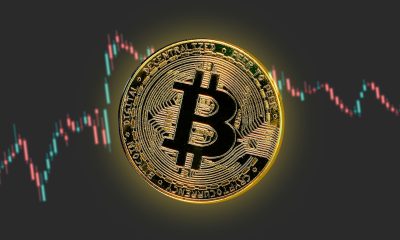Crypto
Cryptocurrency exchanges are becoming more expensive for investors
Aside from currency fluctuations cryptocurrency traders have another variable to consider. Exchanges have complete freedom to reduce or increase their fees and commissions which can impact long term profits. For example in Autumn 2019 the Coinbase Pro exchange designed for institutional investors increased commissions for clients with monthly turnovers under $10,000 by 233%.

When Coinbase Pro raised their commision users were outraged. However the management of the exchange said that the change will help to increase the depth and liquidity of the markets and encourage investors to make larger fees. The long term intention was to nudge users to increase their trade volumes in order to avoid the fees.
If you’re in a rush the Born2Invest crypto news app helps you digest crypto news summaries in with short summaries, helping you be up to date with the newest information in this field. Our team of experts puts the most important cryptocurrencies news at your fingertips.
Commissions on crypto exchanges
Typically a trader pays a certain fee for depositing or withdrawing coins. Usually, if the transaction is made directly in cryptocurrency, the user either does not pay anything or gives the minimum amount. If the transaction with fiat funds a larger fee is usually levied to cover the costs.
Each exchange has a different approach. For example Binance uses a withdrawal fee in place of a deposit fee. The fee is set separately for each coin along with a minimum withdrawal amount. Similar rules are applied on the EXMO exchange while Bitfinex charges a fee for small deposits under $1000.
Bitfinex claims that the excess number of small deposits leads to a large number of micro-transactions in wallets, which makes it necessary to spend resources on consolidation and delay the withdrawal of funds for clients. The platform wants to combine deposits in larger amounts for the platform to work without interruption for all customers.
Traders category definition
For a trade operation (transfer of funds to another account) – a certain amount is deducted from a trader for opening and buying an order. Many exchanges have recently introduced a distinction between transaction fees depending on the category of traders: Makers and Takers.
A Maker is someone who draws up deals and puts them up for sale. Such people bring their assets to the stock exchange and increase their activity on it.
A taker is someone who buys open orders created by the maker. Usually the exchange charges a lower commission for the maker than for the taker. Since the former improve liquidity, the latter, on the contrary, reduce it, so they pay a higher percentage.
The differentiation of commissions depending on the categories of traders is used by Bitfinex, Binance, Poloniex, Coinbase Pro and others.
How to choose profitable crypto exchange
At the end of October this year, analyst Austin Jacob published this year’s top 13 best crypto exchanges on the BitPremier portal. The analysis took into account the low cost of commissions, the efficiency of technical support, confidentiality, liquidity, reputation, speed, and other parameters. The Coinbase exchange was in the first place, the Coinmama site took the second, and the third was given to the portal Bitpanda. The rating also included: Kraken, LocalBitcoins, Bitstamp, Binance, Bitfinex.
However, the ratings do not always allow you to make the right choice, although they help to navigate in a variety of crypto exchanges. On the official website of almost every exchange it is indicated what fees the platform charges its users. Depending on the role of the trader (maker or taker), with which cryptocurrency interacts and in what amounts, the fee is set.
Full verification for users
It is necessary to understand that fees decrease at some exchanges if the user has passed full verification. Anonymous traders usually have to pay more. Another way to save on fees is to choose exchanges with their own cryptocurrency. In mid-November, the South Korean stock exchange Bithumb announced plans to issue its own token on blockchain Bithumb Chain.
The company said that altcoins will become a means of payment of exchange fees, transaction fees and rights to use the trading floor systems. Other large exchanges already have their own tokens. You can pay internal fees at a discount on the same platforms with the help of coins: BitMax Token, OKEx Utility token, Huobi Token, KuCoin Shares, and Binance Coin.
__
(Featured image by D’Vaughn Bell via Pexels)
DISCLAIMER: This article was written by a third party contributor and does not reflect the opinion of Born2Invest, its management, staff or its associates. Please review our disclaimer for more information.
This article may include forward-looking statements. These forward-looking statements generally are identified by the words “believe,” “project,” “estimate,” “become,” “plan,” “will,” and similar expressions. These forward-looking statements involve known and unknown risks as well as uncertainties, including those discussed in the following cautionary statements and elsewhere in this article and on this site. Although the Company may believe that its expectations are based on reasonable assumptions, the actual results that the Company may achieve may differ materially from any forward-looking statements, which reflect the opinions of the management of the Company only as of the date hereof. Additionally, please make sure to read these important disclosures.
First published in РБК, a third-party contributor translated and adapted the article from the original. In case of discrepancy, the original will prevail.
Although we made reasonable efforts to provide accurate translations, some parts may be incorrect. Born2Invest assumes no responsibility for errors, omissions or ambiguities in the translations provided on this website. Any person or entity relying on translated content does so at their own risk. Born2Invest is not responsible for losses caused by such reliance on the accuracy or reliability of translated information. If you wish to report an error or inaccuracy in the translation, we encourage you to contact us.

-

 Crowdfunding2 weeks ago
Crowdfunding2 weeks agoReal Estate Crowdfunding in Mexico: High Returns, Heavy Regulation, and Tax Inequality
-

 Cannabis1 week ago
Cannabis1 week agoSouth Africa Proposes Liberal Cannabis Regulations with Expungement for Past Convictions
-

 Crypto3 days ago
Crypto3 days agoCrypto Markets Under Pressure as Vitalik Buterin Sells 17,000 ETH
-

 Markets2 weeks ago
Markets2 weeks agoWeather-Driven Supply Outlook Lifts Coffee Markets in Brazil and Vietnam
























